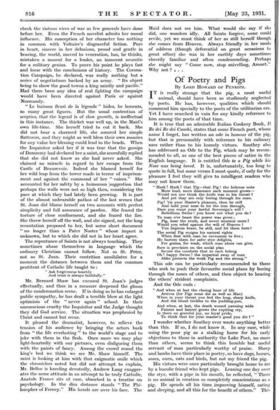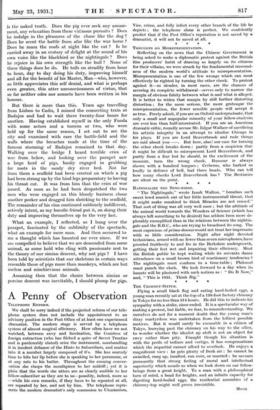Of Poetry and Pigs
By LORD HOWARD OF PENRITH.
TT is really strange that the pig, a most useful animal, should have been so studiously neglected by poets. He has, however, qualities which should commend him specially to the poets of the utilitarian era. Yet I have searched in vain for any kindly reference to him among the poets of that time.
It is true that an admirable Italian Cookery Book, Il Re dei Re dei Cuochi, states that some French poet, whose name I forget, has written an ode in honour of the pig, but that is presumably with reference to his culinary uses rather than to his homely virtues: Southey also has addressed an Ode to the Pig, which may be recom- mended to all, as one of the best pieces of satire in the English language. It is entitled Ode to a Pig while his Nose was being bored. It is, unfortunately, too Tong to quote in full, but some verses I must quote, if only for the pleasure I feel they will give to intelligent readers who may not know them.
" Hark ! Hark I that Pig—that Pig ! the hideous note More loud, more dissonant each moment grows— Would not one think the knife was in his throat ?
And yet they are only boring through his nose. Pig! 'tis your Master's pleasure, then be still And hold your nose to let the iron through, Dare you resist your lawful Sovereign's will ?
Rebellious Swine ! you know not what you do ! To man o'er beast the power was given ; Pig, hear the truth, and never murmur more ! Would you rebel against the will of Heaven ?
You impious beast, be still, and let them bore ! The social Pig resigns his natural rights When first with man he covenants to live ; He barters them for safer stye delights, For grains, for wash, which man alone can give.
Sure is provision on the social plan Secure the comforts that to each belong Oh ! happy Swine ! the impartial sway of man Alike protects the weak Pig and the strong."
This ode can be particularly recommended to those who seek to push their favourite social plans by boring through the noses of others, and then object to hearing the others' strident complaints.
And the Ode ends :
" And when at last the closing hour of life Arrives (for Pigs must die as well as Man) When in your throat you feel the long, sharp knife, And the blood trickles to the pudding-pan, And when, at last, the death wound yawning wide Fainter and fainter _grows the expiring cry, Is there no grateful joy, no loyal pride, To think that for your master's good you die ? "
I wonder whether Southey ever wrote anything better than this. If so, I do not know it. In any case, while using the poor pig as a stalking horse for his early objections to those in authority the Lake Poet, no more than others, seems to think this humble but useful servant of man particularly worthy of praise. Sheep and lambs have their place in poetry, so have dogs, horses, asses, oxen, cats and birds, but not my friend the pig.
His virtues were once particularly brought home to me by a bucolic friend who kept pigs. Leaning one day over the stye, with • a pipe. in his mouth, he reflected, " There is no animal in creation so completely conscientious as a pig. He spends all his time. improving himself, eating and sleeping, and all this for the benefit of others." This is the naked truth. Does the pig ever seek any amuse- ment, any relaxation from these virtuous pursuits ? Does he indulge in the pleasures of the chase like the dog ? Does he scent the battle from afar like the war horse ? Does he roam the roofs at night like the cat ? Is he carried away in an ecstasy of delight at the sound of his own voice like the blackbird or the nightingale ? Does he rejoice in his own strength like the bull ? None of these things does he do. He toils on steadily from hour to hour, day to day doing his duty, improving himself and all for the benefit of his Master, Man—who, however, so little appreciates this self denial, and what is perhaps even greater, this utter unconsciousness of virtue, that so far neither odes nor sonnets have been written in his honour.
But there is more than this. Years ago travelling from Lisbon to Cadiz, I missed the connecting train at Badajos and had to wait there twenty-four hours for another. Having established myself in the only Fonda with some actors and a torrero or two, who were held up for the same reason, I set out to see the city and examined with care the battle-field and the walls where the breaches made at the time of the famous storming of Badajos remained to that day. Walking over the bridge I heard terrible cries of woe from below, and looking over the parapet saw a large herd of pigs, busily engaged in grubbing for roots in the sandy dry river bed. Not far from them a scaffold had been erected on which a pig had been strung up by the hind legs preparatory to having his throat cut. It was from him that the cries of woe issued. As soon as he had been despatched the two men who were engaged on this bloody business chose another porker and dragged him shrieking to the scaffold. The remainder of his clan continued sublimely indifferent, actively intent, as my bucolic friend put it, on doing their duty and improving themselves up to the very last.
What an example, I reflected, as I hung over the parapet, fascinated by the sublimity of the spectacle, what an example for mere man. And then occurred to me a thought which has haunted me ever since. If we are compelled to believe that we are descended from some animal, as some hold who cling with passionate zest to the theory of our simian descent, why not pigs ? I have been told by scientists that our skeletons in certain ways resemble those of pigs more than monkeys, which are but useless and mischievious animals.
Assuming then that the choice between simian or porcine descent was inevitable, I should plump for pigs.







































 Previous page
Previous page